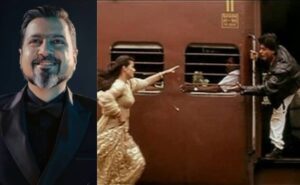
Spoilers follow for the second season of Poker Face through season finale “The End of the Road,” which premiered on Peacock on July 10.
In the world of Poker Face, if a petite, raspy-voiced itinerant who reflexively says “bullshit” in response to an untruth tries to befriend you, run. Human lie-detector test Charlie Cale (Natasha Lyonne) is an accidental menace to herself and others, and the second season of Poker Face is punctuated by one tragedy after another for Charlie. She met a lovely man who served her rotisserie chicken and chatted Christmas movies with her, and he was killed and propped up like a mannequin in the same big-box store where they were falling in love. She befriended a New Yorker who shared her admiration for the film Michael Clayton, and that woman was burned alive. And in the season finale, Charlie’s ability to discern deception is foiled in spectacular fashion by the world’s best assassin, whom Charlie had previously befriended and inadvertently ends up leading to her target. When Charlie hits the road in the final minutes of season two, her sense of self has crumbled, her friends are gone, and her life is a mess.
Poker Face has played fast and loose with how Charlie’s gift actually works, an intentional ambiguity that only gets more complicated with the reveal that actually, yeah, Charlie can be lied to. With the series’ foundational conceit shattered, where does Poker Face go from here? And with Charlie serving as the walking embodiment of Murphy’s law, who seems to unintentionally harm every person with whom she comes into contact, another question: How long can Poker Face keep tormenting its protagonist like this? The series’ second season was mostly an improvement on the first thanks to its more thorough commitment to episodic storylines and its deepening of Charlie’s internal life. But the final two episodes call into question Poker Face’s long-term potential, both in terms of how it treats Charlie as a human being and the increasingly fraught situations in which it places her. As we wait for a season-three renewal, some questions about which cards Poker Face has already played and the ones it plays next.
How long can Poker Face avoid explaining Charlie’s gift?
One of Poker Face’s most consistent in-series tropes is that Charlie’s ability doesn’t really have an explanation, which is a smart way for the show to basically do whatever it wants with it. There’s clever tension in Charlie’s involuntary “bullshit” reaction and her stammering inability to break down how it works, like in season premiere “The Game Is a Foot” when she says, “I’m not exactly sure, but that’s not really the point.” The point instead is how Charlie reacts to the truths she learns and how she then confronts people about their shady behavior.
So it’s a little odd and unnecessary that Poker Face trips over itself in season finale “The End of the Road” by trying to justify why the assassin known as the Iguana (Patti Harrison) was able to lie to Charlie by pretending to be her friend Alex. Charlie’s explanation that the Iguana/Alex had gotten away with her lies because she’d “never done it when I’m trying to catch you” doesn’t exactly track, since we’ve seen Charlie identify people’s lies even when she wasn’t trying to. If the point is that Charlie was so worn down by all the death around her, and so lonely for a friend, that she fell for the Iguana’s schemes, then theoretically Poker Face’s third season will be built around Charlie regaining her gift and accepting it for what it is. (A classic superhero trope!) But at a certain point, Poker Face is only interrupting its own flow by constantly reminding us that Charlie doesn’t have a backstory, and overloading the foreshadowing by having characters like John Cho’s con artist, Guy, tell Charlie “nobody is foolproof.” The series has done a good job developing Charlie into a talented investigator outside of her ability; it doesn’t need the repetition of bringing up what she does or doesn’t know about her own mind.
How long can Poker Face keep emotionally devastating Charlie?
Poker Face clearly knows that it’s treating Charlie like crap, because her increasing loneliness is a key component of the second season: She takes an office job because she feels isolated on the road, she starts chatting with Good Buddy (voiced by Steve Buscemi) over her car’s CB radio so she can have regular contact with another human being, she decides to move to New York City so the overpopulated city can serve as a sort of white-noise machine for her brain. Charlie’s reluctance to form relationships with other people because she’s convinced she gets them killed is really compelling stuff for Poker Face to work with, but also, God, is it depressing! Charlie discovers her love interest’s dead body in “One Last Job,” loses a friend in “A New Lease on Death,” and then also loses two of the most consistent relationships in her life in “The End of the Road,” with mob boss turned informant Beatrix Hasp (Rhea Perlman) getting murdered and FBI agent Luca Clark (Simon Helberg) abandoning her. “Introspection, it makes me queasy,” Charlie starts the season saying, but then she pours her heart out to Alex with “I know where this goes … people, well, they don’t like the truth as much as they think they do” — and then Alex ends up betraying her too!
How much more of this can Charlie take? Is she going to have a Liar Liar–style breakdown in season three? Does she isolate herself entirely from people until one special case compels her to come back? More important than the question “How do Charlie’s powers work?” is “How can Charlie use her powers without someone dying around her, and breaking her heart?” — which is exactly why more episodes in season three should have the relatively low stakes of “Sloppy Joseph.” With all due respect to Joseph Gerbils, no human was killed, but Charlie was still able to reveal a demonic child’s malevolent actions, make a difference for a father-and-son duo, and leave a positive impact on an elementary-school community before leaving town. Lyonne is a good enough actress to sell Charlie’s exacerbating distress, but Poker Face is getting pretty close to overusing the “Here’s an agonizing lost relationship for our protagonist” move. It would be nice if The Simpsons meme about zero days without an accident in Springfield’s nuclear power plant weren’t so easily adaptable to the number of days between Charlie’s friends getting murdered.
How long can Poker Face keep relying on the FBI?
The most grating element of the series’ first season was its overreliance on law enforcement as arbiters of the justice that Charlie couldn’t dole out, so it was a relief when the second season mostly pivoted away from that by weaving in critiques of the police. The cops in “The Game Is a Foot” were useless in aiding Charlie’s suspicions of the Kazinsky sisters, “Whack-A-Mole” featured John Mulaney’s dirty FBI agent, and “The Taste of Human Blood” smirked at cop culture and the kind of police who get elevated within their departments. All of that allowed Charlie to remain the focus of the series’ concept of right and wrong, and pivoted her into new relationships rather than constraining her too much to Agent Luca. But then, well, “The End of the Road” blew that all up. It’s within the series’ adjusted treatment of law enforcement that the FBI is now zealously and wrongly chasing Charlie. It feels like a step backward, though, to tie Charlie and Luca’s storylines together again, and to introduce another long-term chase arc. This series doesn’t really need to be believable in this way! Which leads us to …
How long is Poker Face built to last?
In season one, Poker Face had the season-long arc of Charlie fleeing the Frosts, corrupt casino owners with ties to organized crime. In season two, Poker Face mostly pushed that narrative to the background by seemingly dispatching of Charlie’s beef with the Five Families and mob leader Beatrix Hasp in the first three episodes, and what came after was — aside from the consistent blows to Charlie’s mental health — pretty fun! Hour-long jaunts in which Charlie went head-to-head with various scoundrels kept the series consistently fresh and more satisfying than the recurring beat of “then Charlie’s pursuers showed up and she had to flee.” But the cliffhanger ending of “The End of the Road,” in which the FBI is on Charlie’s tail, suggests a return to the format of season one, in which a single group of Charlie’s enemies disrupted the series’ ability to creatively attack each episode on its own terms. Poker Face is now adept enough at building tension that it doesn’t need the shortcuts of assassins tracking down Charlie in parking lots or orchards or a traumatic loss driving her out of town. When Charlie asks, “What was I even running from?,” the moment is played for laughs as paid-for-hire killers shoot through her soda cup and set her off again, but Poker Face should take that aside to heart. Charlie traveling around the country of her own volition and looking for America, Simon and Garfunkel style, could power this series forever.
How long until Charlie gets a new ride with another CB radio now that her Barracuda is smashed at the bottom of the Grand Canyon?
Hopefully very soon, because if Charlie ever needed to talk to her Good Buddy about the crap she’s going through, it’s now.
More From This Series
“This” being “emotionally devastating Charlie.”

































































